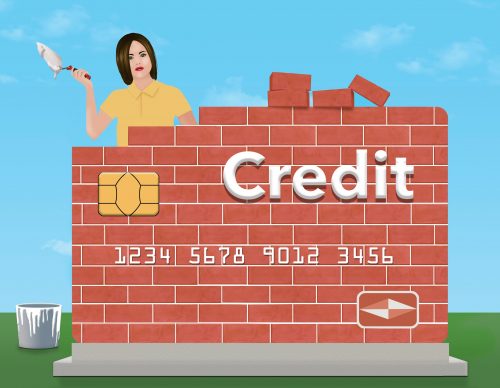If you are not one of the 22 million millionaires in the United States, according to Zippia, learning how to build credit can be helpful as you integrate financial literacy. No one expects you to know how, considering you were not taught how to build credit in school.
Allow us to serve as that financial guide in this article or through transparent hourly financial advice in the Bay Area.
There are many myths about credit, it’s not evil. Debt can be a handy tool when used responsibly. You need an excellent credit score for the greatest benefits—something that doesn’t happen naturally.
Finding affordable financial planning in the Bay Area may be a challenge if you don’t have a couple million, but that’s not the case with Humanity Wealth Advisors. We love providing financial education to all.
So, here’s what we believe you should know about why you should build your credit and how to do it.
How Does Credit Work?
When you request any loan, the lender must consider the likelihood of repayment.
If you’re unlikely to repay the loan, the lender will likely deny you the loan or request a high-interest rate to justify the risk they’re undertaking. If you’re likely to repay the loan, the lender will approve your loan request and offer you better terms.
Your credit score represents your likelihood of repayment.
Your credit score directly reflects how you’ve managed debt in the past. Scores can range from 300 to 850 and represent your risk as a borrower: the lower your score, the higher your risk.
If you have a high score, you will be more likely to be approved for loans and at favorable terms; the lower your score, the more likely you will be denied or approved at less favorable terms.
Why Should You Build Credit?
 Since lenders check your credit score every time you request a credit product of any form (mortgage, car loan, credit card) and your score dictates the terms you will receive, having an excellent credit score is paramount.
Since lenders check your credit score every time you request a credit product of any form (mortgage, car loan, credit card) and your score dictates the terms you will receive, having an excellent credit score is paramount.
The difference between an excellent credit score and a fine credit score could change the interest rate on your mortgage by 1% or more. That may not seem like a lot, but after 30 years of payments, that extra 1% may mean tens of thousands of dollars.
A higher credit score means better approval rates, lower interest rates, better terms, and other rewards.
How To Build Credit
Building a solid credit score can be time-consuming, so starting early is best. If you plan to buy a house or a new car in the next several years, you can start with a credit card now.
How to Build Credit with a Credit Card
Credit cards are the most popular means of building credit. They’re easily accessible and can be used seamlessly with everyday life.
However, credit cards can be a slippery slope. If you open a credit card to build credit and then max out your card and miss monthly payments, your credit score will suffer, creating a snowball of debt for yourself. It’s this type of irresponsibility that gives credit cards their bad rap.
If you don’t buy things you can’t afford, pay your balance every month, and aim to have a low credit utilization ratio (spending less than your credit limit each month), you will be on the fast track to building good credit.
Using a credit card responsibly shows lenders a track record of debt payments, raising your creditworthiness and credit score. The higher your credit score, the more debt you will have access to, and the lower your interest rates on that debt will be.
To reiterate, here are the steps for building credit with a credit card:
- Open a credit card account: go online to find the best card for your needs (there are many websites that rank credit cards).
- Spend less than your limit and pay your bill in full and on time each month: this combination of activities can work wonders for your creditworthiness.
- Request credit limit increases once per year: a higher credit limit allows you to have a lower utilization rate, enhancing your score.
- Occasionally check your credit score: most credit cards allow you to do this for free without it damaging your credit score.
How to Build Credit Without a Credit Card
Credit cards may be the most common tool for building credit, but they’re not your only option.
Remember, your credit score is simply a reflection of how you’ve managed debt historically. Any account reported to credit bureaus has the potential to boost your creditworthiness.
Here are three ways to build your credit without a credit card:
1. Pay existing installment loans diligently.
Do you have a student loan, auto loan, medical debt, or another personal loan form?
Like a credit card, the activity on these accounts directly impacts your credit score. Consistently making on-time payments can be a massive boost to your creditworthiness. Conversely, late or less-than-full payments will nosedive your score.
2. Add your monthly bills to your credit report.
Consider getting them added to your credit report if you have a long history of paying bills on time (like utilities, cell phone, rent, or Wi-Fi). There are several services you can use to do this.
3. Become an authorized user.
If you can’t get a credit card because you don’t yet qualify, consider becoming an authorized user on a loved one’s card. Though the primary cardholder is ultimately responsible for the account and its payments, the card’s activity will be reported on your credit profile in addition to theirs.
If the card is used irresponsibly (by either party), you and your partner’s credit will be negatively affected.
The Factors That Influence Your Credit Score
Several factors affect your credit score, including:
- Payment history
- Your debt balances
- Credit utilization
- Types of credit accounts currently open
- Bankruptcies
- The volume of new credit accounts applied for
Remember
The key to building good credit is consistency.
Use your credit wisely: don’t buy things you can’t afford, make on-time and in-full payments, and be responsible.
Missing payments and letting debt and interest pile up can spiral your financial situation out of control.
Gain financial literacy and build wealth with a fee-only independent financial advisor in Newark, CA.
Call Humanity Wealth Advisors today. Our team specializes in helping individuals, families, and business owners pursue their financial goals and obtain financial freedom. With distinctive service options and flexible payment plans, our goal is to give every person the opportunity to be financially successful.




